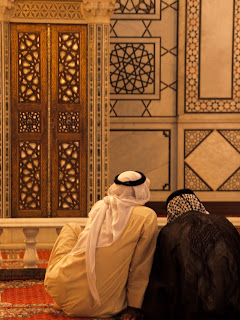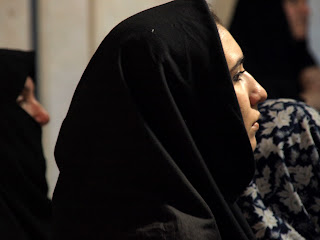Although the old city bore the touches of Romans that had walked past the very cobbled streets we stood on today, only to have their horse carts replaced by boom-boxed cars and modern day soldiers dressed in the Versace, slicked hair dripping excessively to oil any rusty hinge of the many old bab, reminisce some old traditions of the storyteller selling his daily dose of addiction of a tale from the thousand and one splendid nights as you sip another potent tea served from the standing "walking tea stall". Stand in awe of sprawling mosques that attracted the Sunni and Shiite alike in revering not only the names of the Prophet and Hussein, but Christian saints alike as with St John The Baptist (with the number of claims of where his resting albeit severed head laid, he would have been iconised as a Gorgon now) and the female Shia saints.
Churches and synagogues rang out their soulful bells as little kids ran amok in a mayhem to the daily schools wedged between the charming lanes of the old houses, shared amongst with passing peddlers bellowing their wares in creative rhymes while lazy feline stalkers walked about the vegetable markets that seemed to spring up miraculously every morning, only to disappear by the heat of noon.
Old courtyards, aged khan and the Souq, you are never far from history in the old city. Yet venturing out was as rewarding as walking amongst the arches that framed a city built upon the merging cultures of empires that had rose and fell so many centuries ago. The famous Mar Musa for a knee-weakening climb up to the monastic getaway should silence be what you seek, a charming thriving Aramaic village revered for her saint and some of the oldest convents in the world, and the grand Crac de Chevalier for a taste of the Crusade, all brewed a heady mix of history, religious and socio-political periods that seemed to tease Fate for its presiding survival until today. You are talking about witnessing active practices and village life going on as if it had been most naturally done since the dawn of the great epics that shaped the books of Syria. The great Sala'ahdin, the slaves, the code of honour, the families laying the line grids from their buffaloes-drawn carts on fertile lands bursting with crops of golden maize and wheat.
Modern day Syria knows that amalgamating cultural diversity and embracing its past role as a crucial player in the region's religious power matches are the trump cards that it can throw on the bargaining tables, and on that Syria plays it well. Flirting tenaciously with the Hezbollah as well as courting Western powers while appeasing its more conservative and sensitive Islamic brother nations, you know this is one place where the word Allah and the Arabic language span beyond the domain of just one people.
Come here to open your minds. Even if you think you know it all.
Note: Following scenes are taken with permission from
Shiite pilgrims in the Ummayad Mosque commemorating the memory of Hussein




























